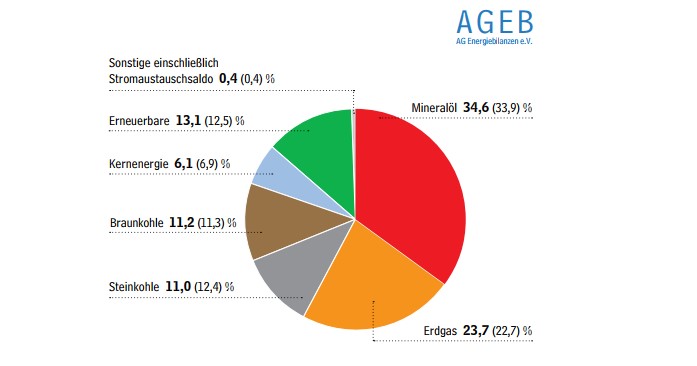German Gas Use Up 5% in 2017
Germany used 5.2% more gas in 2017 than in the year before, reaching 3,200 petajoules (about 85.5bn m3), according to preliminary calculations by AG Energiebilanzen (Ageb), which includes academics and industry groups.
Power generation –including combined heat and power units – was key, but use of gas for heating also grew because some months were cooler than average, and industry’s use picked up too.
Germany's overall primary energy consumption in 2017 was 13,525 PJ, so up just 0.8% year on year, with gas, oil and renewable energy all increasing, whereas coal, brown coal (lignite) and nuclear declined.
Oil use increased by 3% to 4,675 PJ so it remains Germany’s main fuel. Coal use though fell sharply by 10.4% to 1489 PJ, while lignite declined less markedly – down 0.6% to 1510 PJ – as demand from power generators steadily decreased. Nuclear generation dipped by 10.3% to 828 PJ as Germany’s 2011 decision to accelerate its exit from the sector continued implementation.
Renewable energy production was up 6% in 2017 but there were variations in the mix, with hydroelectric generation – excluding pumped storage – down by 4% because of the drier conditions in 2017, whereas wind power was up by 34% year on year, solar up 5%, geothermal up 7%, and biomass and energy from waste were static. All told, renewables accounted for 13.1% of Germany’s 2017 primary energy consumption – putting it in third-place after gas on 23.7% and oil on 34.6%. All three fuels increased their overall market share this year.
The impact of less coal and lignite, but more oil and gas, means that Ageb expects carbon dioxide (CO2) emissions to be “stagnant” – perhaps too close to call whether up or down in 2017.
When it released Jan-Sept data last month, Ageb forecast full-year German CO2 emissions to rise slightly, but that was only the basis of a 1% increase in overall energy – rather than its 0.8% estimate now. Its 9M data last month also indicated German gas use increasing year on year by 9% in the first nine months of 2017, significantly higher than its 3% increase recorded in 1H 2017 and the full year 5.2% now estimated.

Oil, gas and renewables increased their shares year on year of the 13,525 petajoule German energy market in full year 2017 (Graphic credit: AGEB)
From top right clockwise, oil is in red, natural gas (gold), coal (grey), lignite (brown), nuclear (light blue), renewables (green), and net power imports (0.4% of total market)
Europe votes for pro-Paris measure
The European Council and European Parliament voted December 21 in favour of the European Commission's effort sharing proposal to reduce emissions from transport, buildings, waste and agriculture in line with the EU's climate target for 2030. Commissioner for climate change and energy Miguel Arias Canete said: "Today is proof of Europe's intention to stay at the forefront of global climate action, by delivering at home. I thank the Parliament and Council for their work to reach this ambitious outcome. Negotiations have further strengthened our tools to deliver on our Paris commitment. The agreement on the Effort Sharing Regulation puts us firmly on track to achieve our 2030 climate target."



